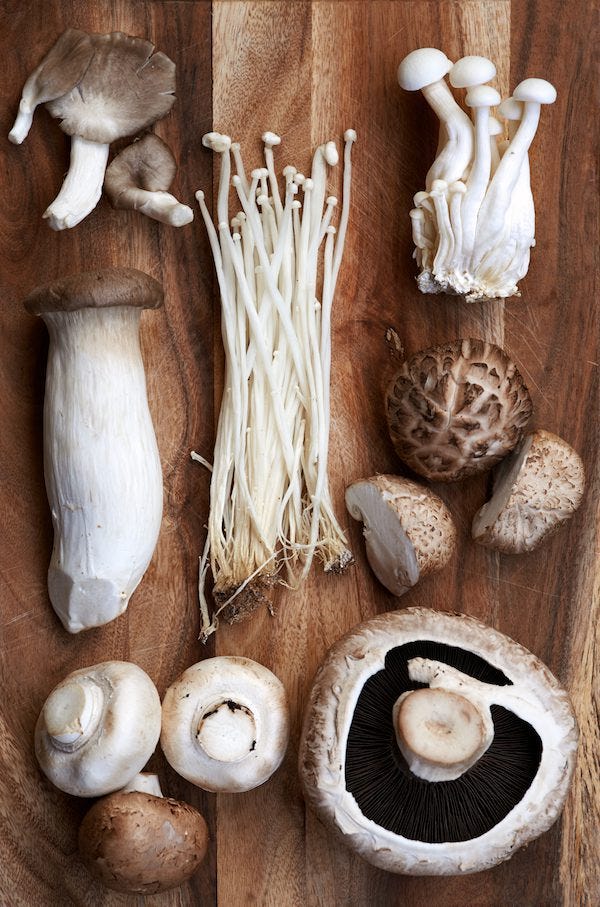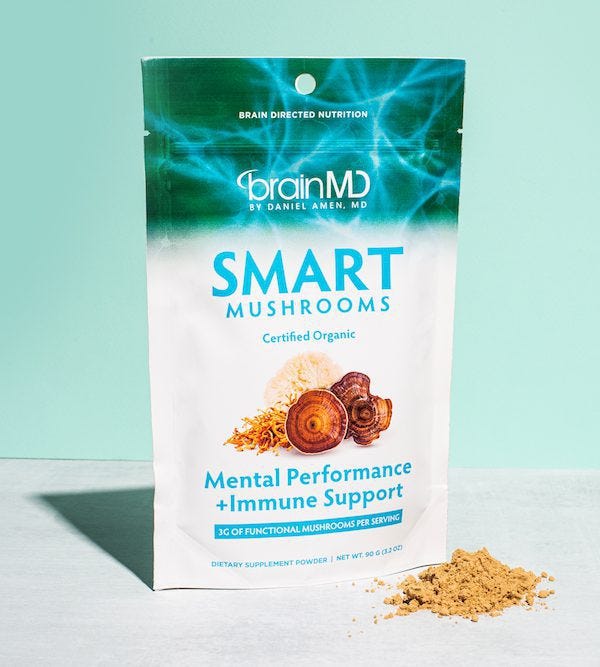6 Functional Mushrooms to Help Boost Your Immunity & Health
I love mushrooms. I always have. I was one of those kids whose favorite grilled treat was thick, juicy portobello mushrooms, and whose favorite pizza was…mushroom pizza. Weird? Maybe. But I was onto something at a young age.
Now, as a functional medicine nutritionist, I have the pleasure of talking with folks about how to include all kinds of nourishing foods in their diet in healthy ways (not so much charring on the grill or on pizza as when I was a kid), and functional mushrooms fall nicely in line as they are full of important immune and brain supporting substances including dietary fiber and plant protein9.
Smart Mushrooms Powder
There are six mushroom varieties in our Smart Mushrooms nutrient powder: Lion’s Mane, Cordyceps, Shiitake, Reishi, Turkey Tail, and Agaricus. I will outline some of the unique and shared health benefits of each of these, and then provide some ideas about how you can include these fungi more often in your diet.
All six varieties contain glucans in various forms. Glucans are a fibrous substance in the cell wall of mushrooms that have been shown to have immune-enhancing abilities by increasing production of immune “fighter” cells, and supporting the health of the digestive tract where most of the immune tissue in our body resides11.
Glucans act as a food source for beneficial bacteria in our gut, provide antioxidant activity, and signal the presence of potentially harmful pathogens, thus triggering an essential immune response16. Other health-benefiting substances in each of the individual mushrooms are outlined below.
6 Functional Mushrooms to Help Boost Your Immunity & Health

1. Lion’s Mane (Hericium erinaceus)
Lion’s Mane is the powerhouse mushroom when it comes to brain and immune health. It has been used in traditional Chinese medicine for at least 1000 years, and is regularly used in cuisines around the world1. It is truly magnificent to see images of this fungi in the wild (if you’re curious, look it up!), as it does truly resemble a lion’s mane.
Lion’s Mane contains nootropic factors, shown consistently to improve brain function in both men and women due to several substances in this mushroom that stimulate nerve growth factor (NGF). NGF regulates the maintenance and repair of neurons, especially those related to acetylcholine, a neurotransmitter vital for memory, cognition, and digestive motility. Additionally, some research has shown that lion’s mane increases brain-derived neurotrophic factor (BDNF) known to support the synthesis of new neurons11, 17. Sign me up, right?
Sample Use: Lion’s mane is a hearty, rich-tasting mushroom often described as similar in consistency to meat or lobster. You can find recipes in which lion’s mane is used in place of steak, liver, and crab. Try roasted lion’s mane for a healthier version of some of the deep frying recipes available online.
2. Reishi (Ganoderma lucidum)
Like the other mushrooms in Smart Mushrooms, reishi contains high levels of glucans, but also has unique substances called triterpenes that add to its immune benefits. Triterpenes promote a necessary inflammatory response in the presence of pathogens that triggers an immune response15. More specifically, a meta-analysis of clinical trial research concluded reishi can enhance the activity of T-helper cells and other thymus-derived immune cells, thus supercharging our immunity6. Reishi has also been found to enhance NGF and BDNF growth factor activity, thus containing the potential to improve human brain health as well as immunity6.
Sample Use: Reishi is difficult to eat due to its highly fibrous nature, so using it in the powdered form in Smart Mushrooms is ideal for obtaining its health-promoting benefits.

3. Shiitake (Lentinula edodes)
Shiitake has been a medicinal food for thousands of years and is a good source of vegetarian protein4. Shiitake has been shown to maintain healthy triglyceride and cholesterol levels, in part due to its high fiber content, and contains both alpha and beta-glucans, including lentinan. Lentinan is a glucan shown to promote a healthy inflammatory response and may have mood-improving effects as well3, 15, 24.
Additionally, shiitake contains a powerful antioxidant called ergothioneine (ET). Research has found that the human digestive tract has special transporter proteins specifically for absorbing ET, which, although not fully understood, suggests this antioxidant is important for healthy human function7.
Sample Use: I use shiitake regularly in an omelet, or in sauteed veggies and soups.
4. Turkey Tail (Trametes versicolor/Coriolus versicolor)
This mushroom contains two beta-glucan polysaccharides, each of which have been intensively researched for immune benefits: Polysaccharide-K (PSK) and Polysaccharide-Peptide (PSP)11. Both can activate the early-warning system in the immune system and enhance the activity and proliferation of a variety of immune cells in response to a pathogen. But PSK and PSP can also act as significant antioxidants in humans and show benefit to the digestive system, liver, heart, joints in animal studies6, 11.
Sample Use: Turkey Tail is also typically too fibrous to be consumed as food, so you can get the benefit by steeping in hot water and drinking after 15-20 minutes, or drinking the powdered form of Smart Mushrooms in a smoothie or other beverage of choice.
5. Cordyceps Militaris, The Orange Caterpillar Fungus
Cordyceps militaris (CM), like the other mushrooms outlined here has…you guessed it – glucans! So, we already know it’s great for digestive and immune health, but CM has specifically been shown to benefit immunity of men over the age of 50, especially important as immune strength declines as we age10.
CM also contains nucleosides – building blocks for our DNA and RNA. Nucleosides essentially power the energetics, growth and maintenance of all our cells2. No small feat! Given this omni-effect on all our cells, it’s no wonder that cordyceps has also been found to improve fatigue, support kidney and liver health, and improve circulation14, 21.
One of the nucleosides CM contains, called adenosine, is an ATP building block. As you may remember from biology class that more ATP = more cellular energy2. Beyond energy production, adenosine also supports regulation of the function of our organ system, and perhaps not surprising then, the brain has a variety of receptor sites specifically for adenosine. This nucleoside is known to assist in regulating sleep, respiration, cardiovascular function, and liver/kidney function10, 18.
Sample Use: Break up dried cordyceps into boiling water. Simmer for 15 minutes to release beneficial substances. Use as tea with lemon and ginger (if desired), or use as broth when making soup.
6. Agaricus (Agaricus blazei)
Agaricus is indigenous to Brazil, and like shiitake, is a rich source of plant protein and contains glucan-rich dietary fiber, including a specific form of beta glucans not commonly found in other mushrooms that activate several components of the immune system including natural killer cells and T-lymphocytes1, 5. Another similarity to shiitake is agaricus’ ability to help maintain optimal cholesterol levels and overall liver health21, 25. In addition, agaricus appears to support healthy glucose levels as well25.
Sample Use: Similar to cordyceps, agaricus is best used as a tea or broth with a variety of spices.

Smart Mushrooms offers substantial promise for improving memory, mood, and other cognitive functions. These six functional mushrooms can help increase energy, wellness, and high-level brain performance.
It’s the smart choice for immune and whole-body support.
[paperio_button tz_button_style=”button-style1″ tz_button_size=”btn-medium” tz_button_text=”Shop Smart Mushrooms” tz_button_url=”https://brainmd.com/smart-mushrooms” tz_button_link_target=”_blank” tz_extra_class=”” tz_extra_id=””]
- Ahn W-S, others. Natural killer cell activity and quality of life were improved by consumption of a mushroom extract, Agaricus blazei Murill Kyowa. International Journal of Gynecological Cancer 14(4):589-594 (2004).
- Alberts B, others. Molecular Biology of the Cell (6th Edition). Garland Science/Taylor and Francis (2015).
- Bao H, others. Lentinan produces a robust antidepressant-like effect via enhancing the prefrontal Dectin-1/AMPA receptor signaling pathway. Behavioral Brain Research 317:263-271 (2017).
- Chang R. Functional properties of edible mushrooms. Nutrition Reviews 54(11):S91-S93 (1996)
- Cho S-M. Analysis of the chemical constituents of Agaricus. Mycobiology 36(1):50-54 (2008).
- Habtemariam S. Trametes versicolor (Synn. Coriolus versicolor) polysaccharides in cancer therapy: Targets and efficacy. Biomedicines 8, 135:26 pages (2020).
- Halliwell B. Ergothioneine – a diet-derived antioxidant with therapeutic potential. FEBS Letters 592:3357-3366 (2018).
- Hetland G, others. Antitumor, anti-inflammatory and antiallergic effects of Agaricus blazei mushroom extract and the related medicinal Basidiomycetes mushrooms, Hericium erinaceus and Grifola frondosa: A review of preclinical and clinical studies. Nutrients 12, 1339:19 pages (2020).
- Jin X, others. Ganoderma lucidum (Reishi mushroom) for cancer treatment. Cochrane Database of Systematic Reviews 2016, Issue 4. Art. No.: CD007731:39 pages (2016)
- Kang HJ, others. Cordyceps militaris enhances cell-mediated immunity in healthy Korean men. Journal of Medicinal Food 18(10):1164-1172 (2015).
- Kidd PM. The use of mushroom glucans and proteoglycans in cancer treatment. Alternative Medicine Review 5(1):4-27 (2000).
- Li IC, others. Prevention of early Alzheimer’s disease by Erinacine-A enriched Hericum erinaceus mycelia pilot double-blind placebo-controlled study. Frontiers in Aging Neuroscience 12, 155:1-13 (2020).
- Li H, others. Food-derived antioxidant polysaccharides and their pharmacological potential in neurodegenerative diseases. Nutrients 9, 778:26 pages (2019).
- Lin B, Li S. Cordyceps as an herbal drug. Chapter 5 in Herbal Medicine: Biomolecular and Clinical Aspects (2nd Edition), ed. Benzie IFF and others. CRC Press/Taylor & Francis (2011).
- Liu Y, others. Therapeutic effects of lentinan on inflammatory bowel disease. Journal of Cellular and Molecular Medicine 23:750-760 (2019).
- Ma B, others. Hericenones and erinacines: stimulators of nerve growth factor (NGF) biosynthesis in Hericium erinaceus. Mycology 1(2):92-98 (2010).
- Mori K, others. Improving effects of the mushroom Yambushitake (Hericium erinaceus) on mild cognitive impairment: a double-blind, placebo-controlled clinical trial. Phytotherapy Research 23:367-372 (2009).
- Oh J, others. 1H-NMR-based metabolic profiling of Cordyceps militaris to correlate the development process and anticancer effects. Journal of Microbiology and Biotechnology 29(8):1212-1220 (2019).
- Phan CW, others. Therapeutic potential of culinary-medicinal mushrooms for the management of neurodegenerative diseases: diversity, metabolite, and mechanism. Critical Reviews in Biotechnology 35(3):355-368 (2014).
- Phan CW, others. Therapeutic potential of culinary-medicinal mushrooms for the management of neurodegenerative diseases: diversity, metabolite, and mechanism. Critical Reviews in Biotechnology 35(3):355-368 (2014).
- Pohleven J, others. Medicinal Mushrooms. Mycomedica (Slovenia) (2016).
- Saitsu Y, others. Improvement of cognitive function by oral intake of Hericium erinaceus. Biomed Research (Tokyo) 40(4):125-131 (2019).
- Shen-nong traditional Chinese medicine database. Coriolus versicolor (Trametes versicolor). shen-nong.com, accessed 23 Sep 2020.
- Zhang Z, others. Lentinan inhibits AGE-induced inflammation and the expression of matrix degrading enzymes in human chondrocytes. Drug Design, Development and Therapy 14:2819- 2829 (2020).
- Firenzuoli F, others. The medicinal mushroom Agaricus blazei Murrill: Review of literature and pharmaco-toxicological problems. eCAM 5(1):3-15 (2008) doi:10.1093/ecam/nem007.
- 4 Simple & Healthy Mushroom Recipes to Try Today - November 15, 2020
- 6 Functional Mushrooms to Help Boost Your Immunity & Health - November 2, 2020



